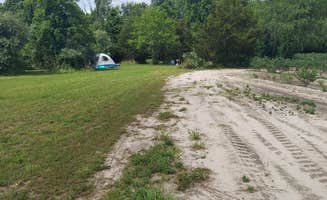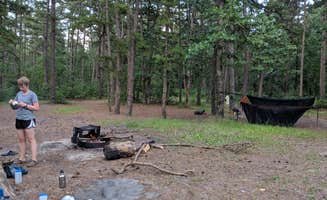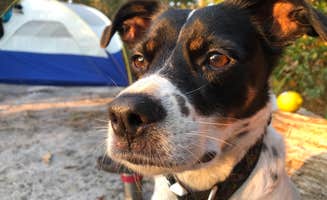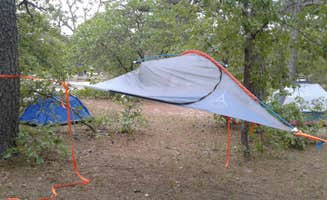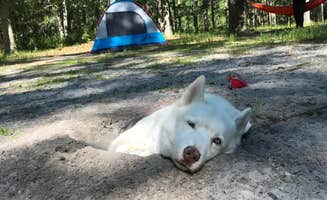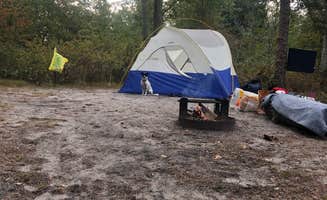Tent camping near Mays Landing, New Jersey primarily takes place within the Pine Barrens ecosystem, characterized by its unique sandy soil composition and acidic water conditions. The area sits at low elevation, typically 50-100 feet above sea level, with minimal topographic variation throughout the camping regions. The climate features hot, humid summers with temperatures regularly exceeding 85°F and moderate bug activity, particularly ticks which thrive in the pine forest environment.
What to do
Kayaking on tannin-rich waters: The Wading River offers a distinctive paddling experience with its naturally dark waters. A camper at Hawkins Bridge noted, "We did a two day Canoe tour down the wading river and used the outfitter Micks Canoe... It's a dark black river from the tannins. Not much fishing, mostly easy with some trick currents for inexperienced paddlers."
Hiking the Batona Trail: This 50-mile trail connects multiple campgrounds and provides access to remote camping areas. At Batona Campground, a visitor mentioned, "Best part of this campground is trailheads begin directly from campsites. Trails vary in length but all are flat and easily accessible."
Backcountry camping experiences: For those seeking more solitude, multiple hike-in campsites offer primitive experiences. A camper at Lower Forge Camp shared, "Located right off the Batona trail you're bound for adventure. It's one of my personal favorites to disappear for a weekend and great for beginners who you're trying to break into backpacking."
What campers like
Sandy, comfortable tent sites: Unlike rockier camping regions, the Pine Barrens provide naturally soft ground. A camper at Hawkins Bridge noted, "Soft, even ground for sleeping. Quiet, private, relaxing. Ease of access with a car. Lots of fallen trees for kindling."
Water proximity at select sites: Some campgrounds feature direct water access. At Goshen Pond, a visitor shared, "Our site was right next to the Mullica River, and had excellent views if you walked just a couple steps from the tent. We were able to put our kayaks in right next to the site which was very convenient."
Secluded camping experiences: Many campers appreciate the remote feeling of the region. A visitor to Batona Campground remarked, "It is so easy to get lost in these woods and I LOVE IT! If you want off the beaten path and not close to anyone... this is IT!"
What you should know
Seasonal operation limitations: Most campgrounds close during winter months. Batona Campground operates from April 1 to October 31, with one reviewer noting, "A water pump provides fresh water but is not available in the winter."
Varying toilet facilities: Facilities range from pit toilets to composting outhouses. At Goshen Pond, a reviewer mentioned, "Only outhouses near the primitive sites. Lots of bugs (ticks)."
Tick and chigger prevalence: Multiple campers warn about insect activity. A Mullica River visitor cautioned, "NOTE: There are LOADS of ticks in this area," while a Goshen Pond camper advised, "Great sites, great trails, lots of hiking and off road trails for dirt bike/atv/trucks. Just gotta check often for chiggers and ticks."
Weekend crowding issues: Weekday camping offers more solitude than weekends. One visitor observed, "During the off season and during the week, it's very peaceful and awesome place to be. During the weekend it's very populated and tends to be pretty noisy."
Tips for camping with families
Choose drive-in sites for easier access: When camping with children, select vehicle-accessible sites. Batona Campground offers convenient setup as "It's only a one minute walk from the parking area to the site."
Consider noise levels when selecting sites: Some campgrounds become noisy on weekends. A visitor at Bodine Field observed, "Originally it was very hard to first locate the site... The campsites are semi close together. Very sandy area. There is a little river area within the site which is fun."
Prepare for minimal amenities: Facilities are limited at most sites. According to one camper, "Very rustic and secluded, no showers/running water. Outhouses all around the campground. Most of the campsites are kind of on top of each other besides a few and most of the group sites."
Group sites availability: Several campgrounds offer designated group camping areas. At Abbot Sawmill, a visitor noted, "Close to the main roads but feels remote," making it suitable for larger family gatherings while maintaining a wilderness experience.
Tips from RVers
Road access limitations: Many campgrounds have restricted vehicle access. At Batona Campground, a reviewer cautioned, "The road into the campground is about 1 mile of loose sand. It can be accessed by a standard vehicle. Sites are suitable for tents or small campers. The unpaved road into the site is narrow and tree lined. A larger RV would not fit."
Limited hookup options: Most Wharton State Forest campgrounds lack traditional RV amenities. For fuller services, Red Wing Lakes provides "electric, water and sewer hookups" according to a seasonal camper.
Smaller rigs recommended: Given the narrow forest roads and limited turnaround space, compact RVs work best. Campgrounds like Bodine Field accommodate smaller recreational vehicles but aren't big-rig friendly, with sites primarily designed for tent camping or modest camper vans.


